
Our Favorite Under-the-Radar Books Published in 2016
There’s been a lot of talk around Book Riot and the bookish world in general about 2016 not being a great year for books. Although there were, for sure, some excellent books this year (see the Best Books of 2016 list), most people felt that the year was kinda “meh.” I am not one of those people. Personally, I read a ton of really great books that just did not get the attention/publicity/bookstore table space they deserved.
Surely, I couldn’t be the only one feeling like there were great but under-appreciated books this year? I asked the Book Riot contributors what books they loved but that didn’t quite hit it big in 2016. The list we came up with is varied– work in translation, novels, essay collections, poetry, and more. It’ll be a good shopping list if you’re picking out a last-minute gift for an avid reader. There’s a good chance they haven’t read one of these yet.
 Shelter in Place by Alexander Maksik (September 13)
Shelter in Place by Alexander Maksik (September 13)
–Ashley Bowen-Murphy
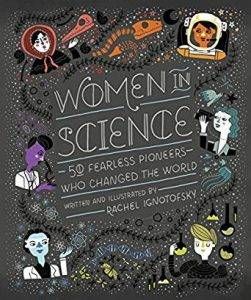 Women in Science by Rachel Ignotofsky (July 26)
Women in Science by Rachel Ignotofsky (July 26)
Women in Science is a slim volume of short biographies of fifty female innovators in the STEM fields. Each biography is illustrated in the signature style of Rachel Ignotofsky (who has an Etsy shop, by the way, so you can have Women in Science pillows). The illustrations are what make this book so amazing, but the biographies are great too. They are written in an accessible style, perfect for children and adults.
–Kate Scott
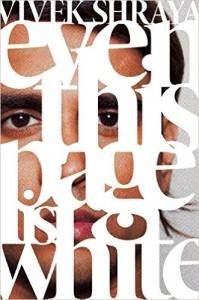 Even This Page is White by Vivek Shraya (September 13)
Even This Page is White by Vivek Shraya (September 13)
This debut book of poetry was published by a small Canadian press (Arsenal Pulp Press), so it’s not surprising it’s not getting a ton of press, but this is really too bad because it’s such an accessible, moving collection of poems. It’s powerful and beautiful, both in its craft playing with poetic structure and different poem types and in its gut-punching content about racism. Even This Page is White is a book to read again and again.
–Casey Stepaniuk
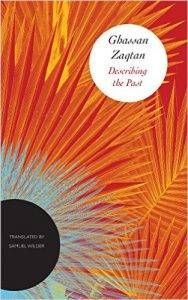 Describing the Past by Ghassan Zaqtan, translated by Samuel Wilder (July 15)
Describing the Past by Ghassan Zaqtan, translated by Samuel Wilder (July 15)
In 2013, Zaqtan won Canada’s prestigious Griffin poetry prize, along with translator Fady Joudah. Zaqtan was also a finalist for the Neustadt in 2014 and 2016, and has been mentioned in betting for the Nobel. But when his short prose work Describing the Past, a gorgeous mapping of memory-logic, came out this summer from Seagull Books, it didn’t seem to get a whisper. Samuel Wilder’s translation matches Zaqtan move for move, and there is not a sentence that doesn’t sit right on the tongue. I was thrilled to see some excellent, under-appreciated Arabic literature get a mention in this year’s PEN Translates longlist (Hilal Chouman’s Limbo Beirut, trans. Anna Ziajka Stanton and Rabee Jaber’s Confessions, trans. Kareem James Abu-Zeid, whoop!), but the PEN judges missed Wilder’s feat of translation. Fortunately, you needn’t.
– M. Lynx Qualey
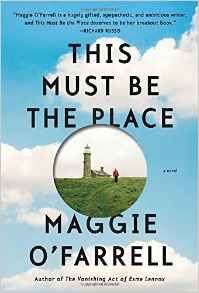 This Must Be the Place by Maggie O’Farrell (July 19)
This Must Be the Place by Maggie O’Farrell (July 19)
Daniel Sullivan is happily married to an eccentric former movie star and current recluse, but he starts to have doubts about his life when he learns that a woman he loved decades ago is dead. When and how did she die? And is it Daniel’s fault? Through flashbacks and stories of those who know Daniel, O’Farrell slowly reveals the secrets of Daniel’s past and raises questions about his future. This novel’s complex structure gives the many characters room to breathe and feel like fully fledged individuals with lives of their own. And the book ends with a tentative hopefulness that I appreciated.
–Teresa Preston
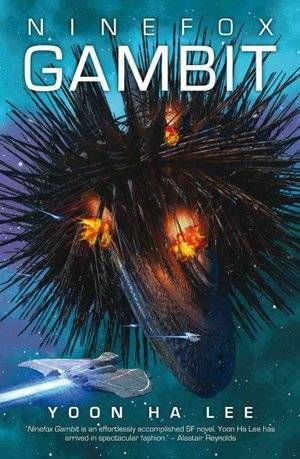 Ninefox Gambit by Yoon Ha Lee (June 14, 2016)
Ninefox Gambit by Yoon Ha Lee (June 14, 2016)
When I finished reading this novel, I experienced that euphoric, giddy pulse of feeling that comes of reading something so fresh, so brilliant, and so delicately well done, that it had my head spinning. Yoon Ha Lee is well known for his mind-bending, emotionally charged science fiction, and Ninefox Gambit is no exception. The tale of a young soldier, unmatched in her mathematical precision and tactics, lieutenant Kel Cheris is ordered to retake the Fortress of Scattered Needles for the Hexarchate, the six-faceted hierarchy of empire in the known galaxy. But in order to oust the rebels and their blasphemous calendar, Kel Cheris must download the literal mind of the Hexarchate’s greatest hero, and greatest villain: Shuos Jedao, brilliant, cutting, and insane after ordering the massacre of an entire space station so he might not lose. What follows is a tense, compassionate, but terrifying look into the balance between these two soldiers, and how they begin to change one another over the course of their ordeals. But the secrets Jedao is harboring may do more than drive Kel Cheris insane: they may bring down the Hexarchate entirely. Smart as hell, emotionally dense and nuanced, and jam-packed with enough blow-your-mind science fiction concepts, Ninefox Gambit deserves every ounce of love it gets, and I certainly hope more people discover it in the years to come.
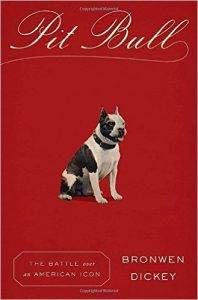 Pit Bull: The Battle Over an American Icon by Bronwen Dickey (May 10)
Pit Bull: The Battle Over an American Icon by Bronwen Dickey (May 10)
I’m obsessed with animal nonfiction, but Pit Bull tackles so much more than that and I’m surprised I didn’t see more of my animal-loving friends talk about it. Pit bull breeds once lived in the White House, starred in movies, fought with soldiers on the front lines – but as time passed, they turned from America’s Dog to America’s Nightmare. Why? Browen Dickey tracks their reputation from beloved to brutal, questioning everything assumed about pit bulls in a beautiful blend of cultural observation and scientific examination. Pit Bull is eloquent and eye-opening, revealing far more about the nature of humans than the nature of dogs.
–Nicole Brinkley
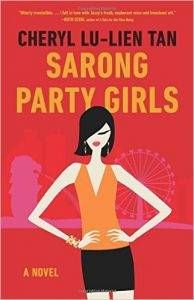 Sarong Party Girls by Cheryl Lu-Lien Tan (July 12)
Sarong Party Girls by Cheryl Lu-Lien Tan (July 12)
I blame this summer’s killer lineup of novels. Inevitably something incredible was going to get overlooked amidst all the hubbub. I was particularly sad to see that it was this sparkling gem of a novel. Sarong Party Girls is not fluff, even if it seems that way at first. It often reminded me of Clueless, and there’s a similar story here, though it’s not as simple as a movie. Jazzy, our protagonist, certainly seems like she belongs in a chick lit romp, she and her best girlfriends shop and drink and party and look for rich white men to marry. But Jazzy’s plans start going off the rails, things begin to fall apart, and the party girl has to start figuring out who she is and what she wants. If you like novels with a strong first-person narration, this is a can’t miss. Jazzy’s voice is a huge part of the joy here, written in Singlish (Singaporean English full of new slang words) it’s also a real find for lovers of words and language.
–Jessica Woodbury
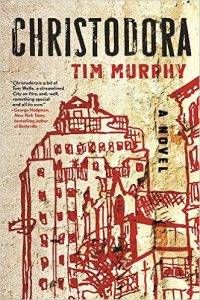 Christodora by Tim Murphy (August 2)
Christodora by Tim Murphy (August 2)
The minute I finished (hell, the minute I started) this book, I expected to spend the rest of the year haunted by its spectre all over social media. So you can imagine how surprised I was when the publication date came and went with little to no fanfare. Tim Murphy’s insight into the East Village in the ’80s and the revolution of AIDS/HIV patients and family members was a revelation. The narrative is absorbing and the characters are at once powerful and vulnerable. Watching the gentrification of Greenwich Village alongside the medical advances in the fight against the AIDS epidemic had me alternating between hope and despair. Murphy’s writing is gritty, raw, and beautiful and I’m still surprised more people aren’t singing its praises.
–Elizabeth Allen
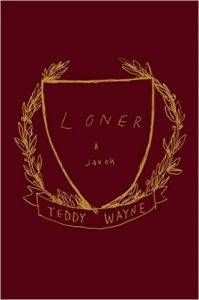 Loner by Teddy Wayne (September 13, 2016)
Loner by Teddy Wayne (September 13, 2016)
Loner was a completely chilling read, and yet, so, so addictive. You need a strong stomach to enter the mind of sociopath David Federman, Harvard freshman and social vulture. As David takes on a mission to climb the ranks of the rich and popular and bring himself closer to the woman he is infatuated with, Veronica, he will stop at nothing to manipulate and use everyone to his advantage if it will help him get what he wants. What I loved about this novel was how skillfully Teddy Wayne immerses the reader in David’s first-person narration until ultimately your own mind is being played on as David subtly shifts into truly losing his mind. But by that point, you don’t even notice how his crack up seems almost normal—until it’s too late. With the twists of a riveting thriller and the emotional depth of a twisted bildungsroman, Loner is as much a mind fuck as it is brutally raw, shocking, and, ultimately, outstanding.
–Sarah S. Davis
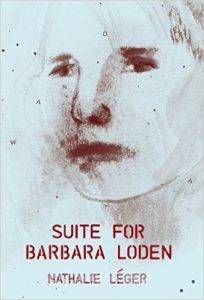 Suite for Barbara Loden by Nathalie Leger, translated by Natasha Leher & Cecile Menon (October 2016)
Suite for Barbara Loden by Nathalie Leger, translated by Natasha Leher & Cecile Menon (October 2016)
In her incredibly haunting novella Suite For Barbara Loden, Nathalie Léger uses the 1970 cult classic film Wanda (which Barbara Loden wrote, directed and starred in) as a vehicle for the type of flowing, hyper-intellectualized meditations that French writers do so well. At the beginning she tells us she’s been paid to write a short entry on Loden for an encyclopedia. She then unpacks the film scene-by-scene (bringing to mind Perec’s obsessive cataloging), dissecting the story of a Pennsylvania coal miner’s wife who walks away from her husband and children. Wanda has no direction, ambition or even desires – her defining emotion is apathy. You get the sense she would have stayed in her marriage, completely indifferent to her situation, had her husband not forced her to leave. Eventually Wanda takes up with an equally damaged and pitiable character, a man named Norman, who convinces her to help him rob a bank. Their story doesn’t end well. Léger pauses throughout to insert biographical details about Loden’s life. She describes a television interview Loden once gave (the other guests were John and Yoko Ono). Léger appears to be trying to find/verbalize a feminist meaning behind the film – searching for parallels between Wanda and Loden. I’m not sure she succeeds, but her struggle has produced a mesmerizing work of unexpected beauty.
–Tara Cheesman
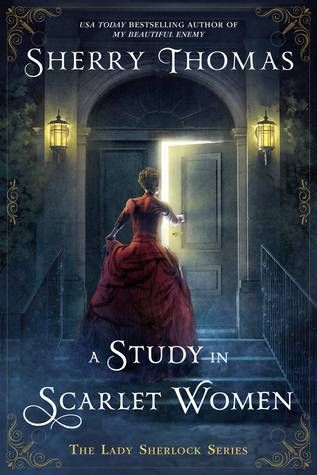 A Study in Scarlet Women by Sherry Thomas (October 18)
A Study in Scarlet Women by Sherry Thomas (October 18)
Sherry Thomas’ story (the first in a planned series) reenvisions Sherlock Holmes as Charlotte Holmes, a brilliant, eccentric young woman in 1880s London. In addition to being an entertaining, well-written mystery, A Study in Scarlet Women also offers a study in feminism. Being a genius with keen observational skills – particularly an unmarried genius with keen observational skills – leads Charlotte down a different path than it does Sherlock. Watching her find ways to navigate the strictures of society is as enjoyable as watching her unravel the mysteries. Like many well-written mysteries, there are twists, turns, and lots of characters, so plan to read this one in one cozy sitting.
-Trisha Brown
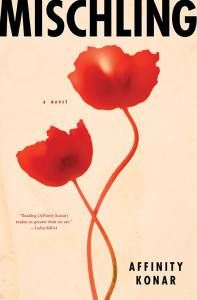 Mischling by Affinity Konar
Mischling by Affinity Konar
(September 6th)
This book is a conundrum. I’m surprised it hasn’t swept more ‘Best of 2016’ lists. I’m still in awe of how Konar managed to pull off such a searingly beautiful story of hope and survival in the wake the greatest horrors ever committed by other human beings. The book is told from the dual perspectives of twins Stasha and Pearl, who have just arrived at Auschwitz. Seen as “special,” the twins are taken in by Josef Mengele, who notoriously performed horrible experiments on children during the Holocaust. Stasha quickly becomes one of Mengele’s pets after he injects her with what she believes to be immortality. With this new power, Stasha must protect her twin sister Pearl and her friends until the end of the war. But when Pearl disappears, Stasha is no longer interested in being one of The Zoo’s favorite patients. She wants revenge. Through the eyes of children, the daily horrors of the twins’ world becomes a cautionary fairytale. I imagine people might shy away from this book because of the subject matter, but I was surprised at how much hope I found in this story. It is thrilling, magnetic, and inspiring, and I have to say, the novel’s conclusion took me completely by surprise.
–Jan Rosenberg
T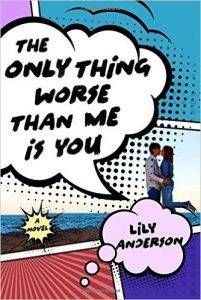 he Only Thing Worse Than Me is You by Lily Anderson (May 17th, 2016)
he Only Thing Worse Than Me is You by Lily Anderson (May 17th, 2016)
This is one of the funniest YA books I’ve ever read, and it’s definitely the nerdiest. Anderson retells Much Ado About Nothing with a competitive high school for academically gifted teens as the setting. The central characters are Trixie and Ben, engaged in a “merry war” of the wits where the prize is class ranking. They’re competing for 3rd place, but when someone begins manipulating the rankings, all bets are off. The banter is hilarious and on-point, and the relationships between the many characters are realistically complicated and wonderfully nuanced. The numerous pop culture nerd references aren’t just decoration–they’re a filter through which these characters see and interpret their world. As a result, this novel is genuine nerdy fun with characters that feel like real teens, with strong opinions and obsessions. It’s an obvious follow-up for fans of Fangirl, but the story has its own distinct personality.
–Tirzah Price
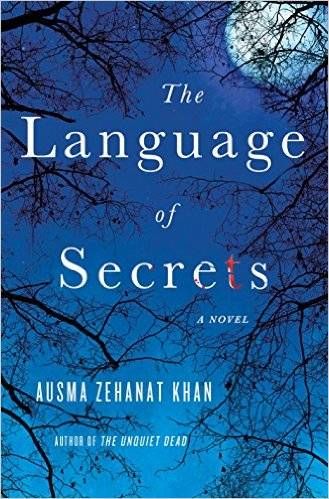 The Language of Secrets (Rachel Getty & Esa Khattak #2) by Ausma Zehanat Khan (February 2)
The Language of Secrets (Rachel Getty & Esa Khattak #2) by Ausma Zehanat Khan (February 2)
I’m really surprised this wasn’t a big mystery seller—it certainly made it onto my Best Of 2016 list. It sucked me in right from the beginning with a murder and held me tight throughout, as Detective Ghetty goes undercover at a Mosque, and had me gripping my book tightly in a super tense ending. If you’re a fan of mystery books this should be on your TBR list—or currently in your hands for immediate reading.
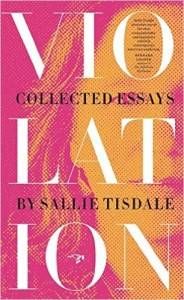 Violation by Sallie Tisdale (April 12)
Violation by Sallie Tisdale (April 12)
I love me a good essay collection, and Violation is now one of my favorites. Tisdale can find meaning anywhere and in anything: one of the best essays in this collection is on flies, and it is fabulous. You really do want to read an essay on flies! And also one on elephants! She has many essays on the natural world, and also on writing, on her family, on culture (Disneyland, dieting, abortion), and so much more. Her sentences are astounding, somehow elegant and earthy both. An essay is a place to spend time in somebody else’s head listening to their thoughts, and Tisdale’s mind is a fascinating place to be.
–Rebecca Hussey
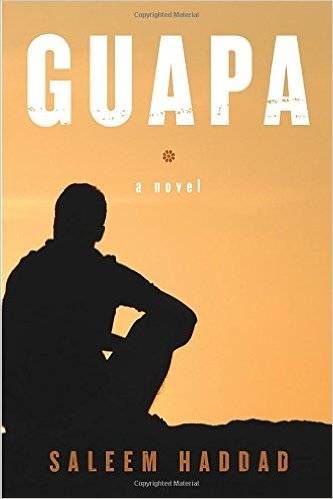 Guapa by Saleem Haddad (March 8)
Guapa by Saleem Haddad (March 8)
It’s not like no one talked about this book. But given how utterly fascinating and completely beautiful it is, I wanted to see this book in every reader’s hands, hear it on every critic’s lips. Because damn. This day-in-the-life of a gay man in crisis in an unnamed Middle Eastern country that is itself in crisis is incredibly good. So I expect to see you reading it forthwith. Forthwith, I say!
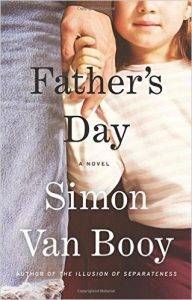 Father’s Day by Simon Van Booy (April 26)
Father’s Day by Simon Van Booy (April 26)
It would not be wrong to say that my tastes veer toward the dark and strange. So when I read a sweet, tender story and it makes my heart grow three sizes instead of roll my eyes, I sit up and listen, because that means the author has done a great job of skipping the saccharine nonsense and written a credible, moving piece of work. Such is Father’s Day. The story of an orphaned girl, her troubled uncle, and the case worker who brings them together, this is less a feel good novel and more a lovely tale of fragile, damaged people learning to love and trust one another. I absolutely adored it.
–Liberty Hardy
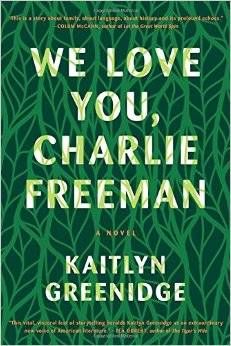 We Love You, Charlie Freeman by Kaitlyn Greenidge (March 8, 2016)
We Love You, Charlie Freeman by Kaitlyn Greenidge (March 8, 2016)
Charlotte Freeman’s family sticks out: because they speak in sign language; because they’ve been tapped to teach a chimpanzee sign language, too. And in the rural town where the Toneybee Institute sits, because they’re black. Greenidge’s gorgeous novel shifts between time periods with skill, covering Charlotte’s contemporary struggles and the Institute’s dark history, which is marked by racial exploitation and the denial of innate human equality. Charlotte learns that, despite Toneybee’s efforts to remake itself, too little has changed between then and now. The novel dances with the limitations and possibilities of communication in an elegant and heartbreaking way. It got great reviews, including from the New York Times, but this small press book that moved the critics hasn’t received nearly enough attention from readers in general. It’s a literary gift that no readers should deny themselves.
What book did you love this year that hasn’t gotten the attention it deserves? Shout it out in the comments.


